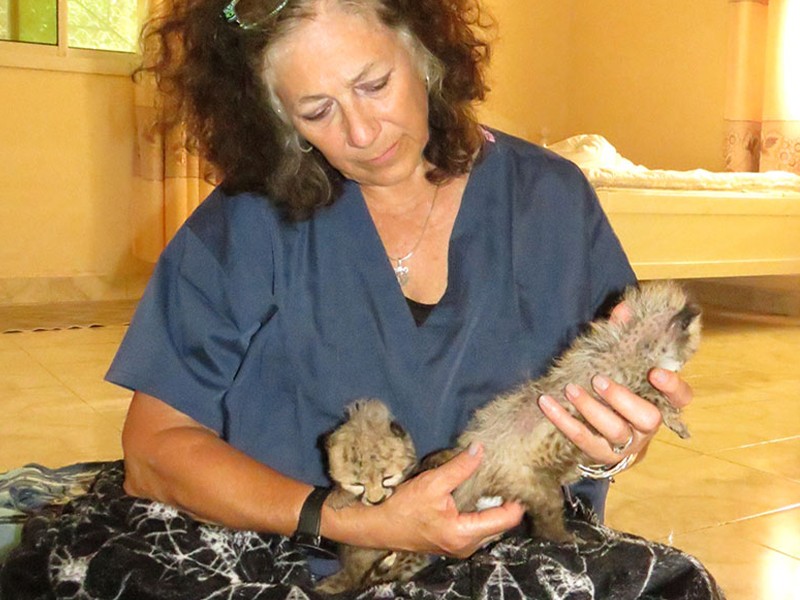Cheetahs, the world’s fastest land animals, are magnificent creatures that evoke awe and wonder. With their incredible speed and elegant spots, it’s no surprise some might dream of having one as a pet. But the reality of owning a cheetah is far removed from this fantasy. Before considering bringing a cheetah into your home, it’s crucial to understand the profound implications for both the animal and yourself. This article will delve into why the answer to “Can You Have A Pet Cheetah?” is a resounding no, exploring the complex issues surrounding exotic pets and the critical need for cheetah conservation.
The Allure of Exotic Pets: Why Cheetahs Might Seem Appealing
The idea of owning an exotic animal like a cheetah can stem from various desires. For some, it’s the thrill of owning something rare and unique, a status symbol that sets them apart. The cheetah’s striking appearance and wild nature can be seen as prestigious and exciting. Social media often portrays a romanticized image of exotic pets, further fueling this appeal. However, these portrayals often ignore the immense responsibility and challenges associated with caring for a wild animal.
Why Cheetahs Are Wild Animals, Not House Pets
Cheetahs are not domesticated animals like cats or dogs. Domestication is a process that takes thousands of years, involving selective breeding to adapt animals to live alongside humans. Cheetahs, on the other hand, remain wild animals with instincts and needs that are fundamentally incompatible with domestic life.
Specialized Care and Dietary Needs
Cheetahs have evolved to thrive in the African savanna and a few pockets in Iran. Their diet in the wild consists of specific prey, and replicating this in a home environment is incredibly difficult and expensive. They require a diet of raw meat, bones, and organs to obtain the necessary nutrients. Commercial pet food is not formulated for their unique physiological needs. Providing this specialized diet is not only costly but also requires expert knowledge to ensure the cheetah remains healthy.
Extensive Space and Exercise Requirements
These sprinters are built for speed and require vast open spaces to run and exercise. Confining a cheetah to a typical house or even a large backyard is detrimental to their physical and psychological well-being. In the wild, cheetahs roam territories of hundreds of square kilometers. Depriving them of the space to run can lead to severe health problems, including obesity, muscle atrophy, and stress-related illnesses.
Untrainable Wild Instincts
Unlike domestic cats, cheetahs are not easily litter-trained. Their urine and feces have a strong, pungent odor that is extremely difficult to manage indoors. Furthermore, their natural instincts, including hunting and territorial marking, cannot be suppressed. They may exhibit unpredictable behaviors, especially when stressed or confined, posing risks to humans and other pets in the household.
Legal and Ethical Roadblocks
Owning a cheetah is illegal in most parts of the world. Cheetahs are protected under international and national laws due to their vulnerable conservation status. Permits for private ownership are extremely rare and are usually only granted to accredited zoological facilities that can demonstrate the capacity to provide appropriate care and contribute to conservation efforts. Beyond legal restrictions, there’s a significant ethical consideration. Keeping a wild animal like a cheetah as a pet is inherently selfish and disregards the animal’s welfare and the broader conservation of its species.
The Devastating Impact of the Illegal Pet Trade on Cheetahs
The desire for pet cheetahs, primarily in the Middle East, fuels a cruel and illegal wildlife trade. Because cheetahs are notoriously difficult to breed in captivity, the demand is met by poaching cubs from the wild, mainly from vulnerable populations in the Horn of Africa.
Wild Cubs Torn from Their Mothers
Cheetah cubs destined for the pet trade are brutally snatched from their mothers at a young age. This separation is traumatic for both the mother and cub. Often, poachers kill the mother cheetah to capture the cubs, further decimating wild populations.
A Perilous Journey and High Mortality Rate
The journey from the African savanna to becoming a pet is fraught with danger. Cubs are often transported in horrific conditions – confined to small crates, deprived of food and water, and subjected to immense stress. It’s estimated that a staggering three out of four cheetah cubs die during transit due to these inhumane conditions.
Unsustainable Demand Threatens Wild Populations
Even those cubs that survive the initial journey often perish within a couple of years in captivity due to improper care, inadequate diets, and the psychological distress of being confined. The constant demand for pet cheetahs creates an unsustainable drain on wild populations, pushing this already vulnerable species closer to extinction. Currently, fewer than 7,500 cheetahs remain in the wild globally, with populations in the Horn of Africa estimated to be critically low.
Rescued cheetah cubs receiving care at a Cheetah Conservation Fund (CCF) Safe House, highlighting the organization’s veterinary expertise in rescuing and rehabilitating cheetahs confiscated from the illegal wildlife trade.
The Role of Conservation: Protecting Cheetahs in the Wild
Organizations like the Cheetah Conservation Fund (CCF) are at the forefront of efforts to combat the illegal cheetah pet trade and protect wild populations. Their work encompasses various critical areas:
Veterinary Expertise and Rescue Operations
CCF provides vital veterinary expertise to rescue confiscated cheetah cubs, working closely with governments like the Ministry of Environment & Climate Change in Somaliland. They operate Cheetah Safe Houses that offer 24/7 care for these vulnerable animals, providing medical treatment, proper nutrition, and a safe environment for rehabilitation.
Scientific Research and Monitoring
Research is crucial for effective conservation. CCF conducts vital research, including DNA banking to determine the origin of confiscated cheetahs, aiding in law enforcement and understanding trafficking routes. They also undertake surveys to monitor wild cheetah populations, particularly in understudied regions like the Horn of Africa, providing essential data for conservation strategies.
Veterinary research and DNA sample collection are crucial aspects of cheetah conservation, enabling the Cheetah Conservation Fund to track cheetah origins and health, contributing to effective wildlife management and anti-trafficking efforts.
Education and Community Engagement
Education is key to long-term change. CCF conducts outreach programs in communities affected by wildlife trafficking, raising awareness about the devastating consequences of the illegal pet trade. They also train livestock veterinarians in wildlife medicine and work with law enforcement and legal officials to strengthen their capacity to combat wildlife crime.
Veterinary training programs conducted by the Cheetah Conservation Fund in Somaliland are essential for building local capacity in wildlife medicine, enhancing the care and conservation of cheetahs and other wildlife.
Policy and Advocacy
CCF actively engages in policy and advocacy work at national and international levels. They collaborate with organizations like the Arabian Leopard Fund to reduce the demand for illegal pets in the Middle East. CCF also supports wildlife enforcement networks and advocates for stronger protections for cheetahs under international conventions like CITES (Convention on International Trade in Endangered Species of Wild Fauna and Flora).
Policy advocacy at international forums like CITES is a critical component of the Cheetah Conservation Fund’s strategy to combat the illegal wildlife trade and enhance global protections for endangered cheetahs.
How You Can Help Cheetah Conservation
The fight to save cheetahs from the illegal pet trade requires collective action. Here’s how you can contribute:
- Spread Awareness: Educate your friends and family about the realities of the illegal pet trade and why cheetahs do not make good pets. Share articles and information from reputable conservation organizations like CCF.
- Report Illegal Activity: If you encounter any suspected illegal activity involving cheetahs or other wildlife, report it to the appropriate authorities or organizations like CCF. Your report can be confidential and make a real difference.
- Support Conservation Organizations: Donate to or volunteer with organizations like the Cheetah Conservation Fund. Your support directly contributes to their on-the-ground conservation efforts, rescue operations, and educational programs.
- Be Mindful on Social Media: Avoid engaging with or “liking” social media posts that depict cheetahs or other wild animals as pets. This inadvertently contributes to the normalization and demand for exotic pets.
Conclusion: Cheetahs Belong in the Wild
The answer to “can you have a pet cheetah?” is definitively no. Cheetahs are wild animals with complex needs that cannot be met in a domestic setting. The illegal pet trade not only causes immense suffering to individual animals but also pushes wild cheetah populations closer to extinction. By understanding the realities of exotic pet ownership and supporting cheetah conservation efforts, we can help ensure these magnificent animals continue to thrive in their natural habitats for generations to come. Let’s appreciate cheetahs for their wild beauty and support their right to remain wild.

